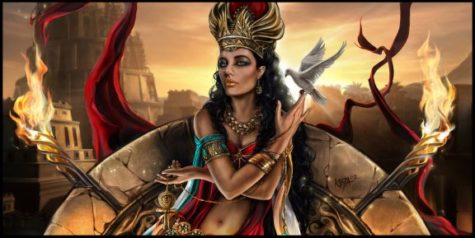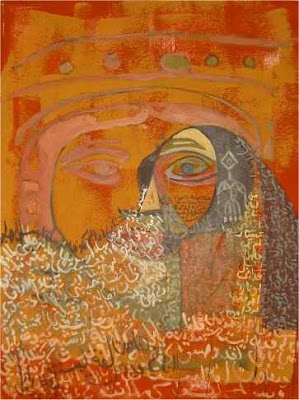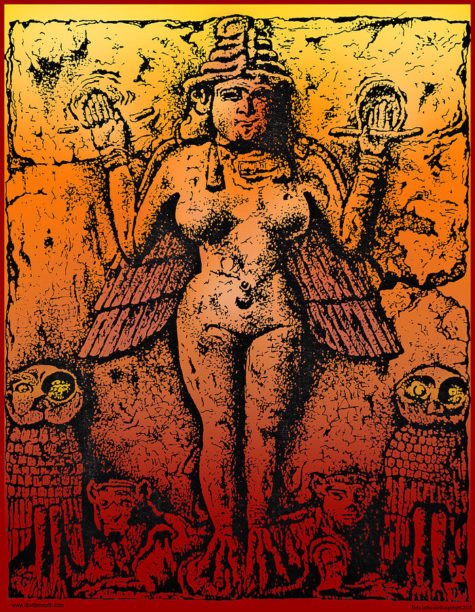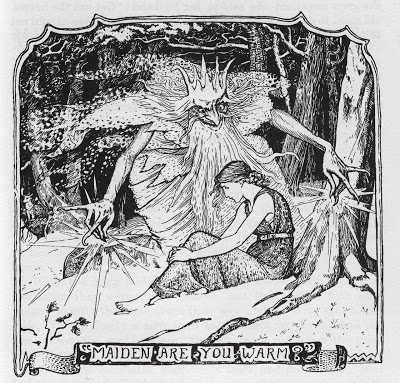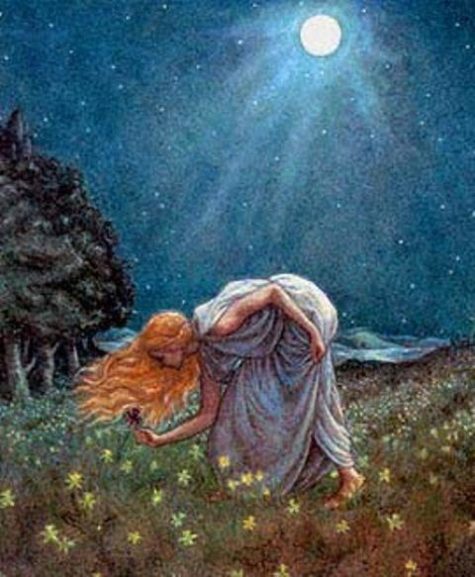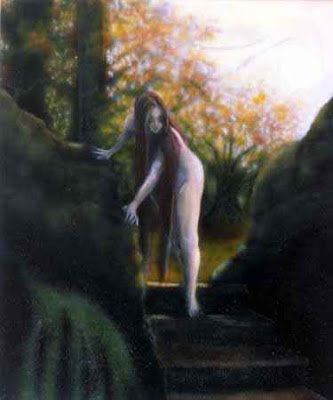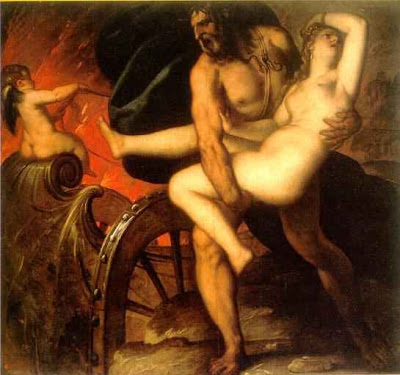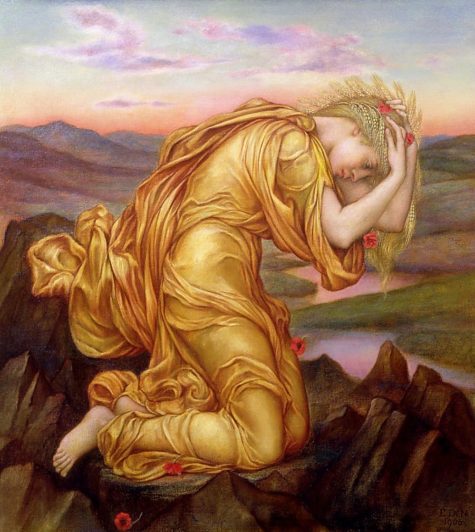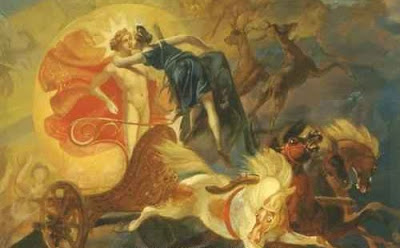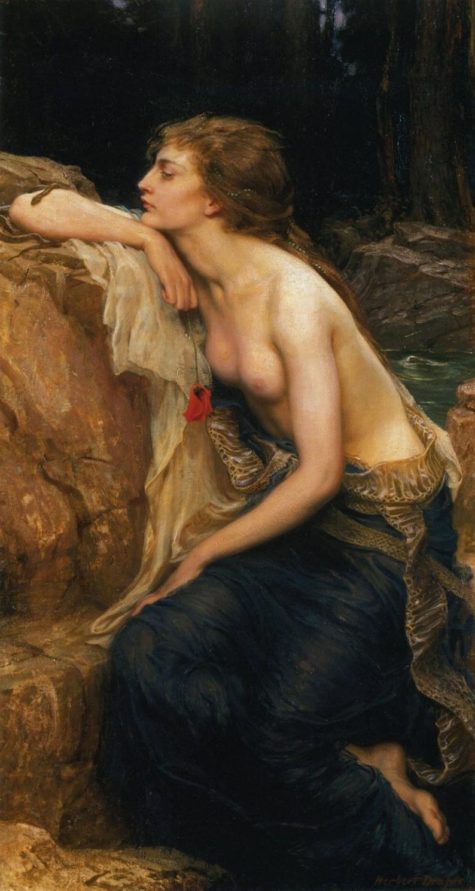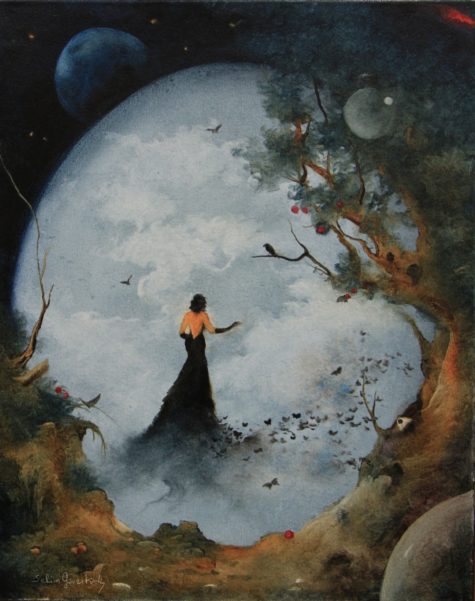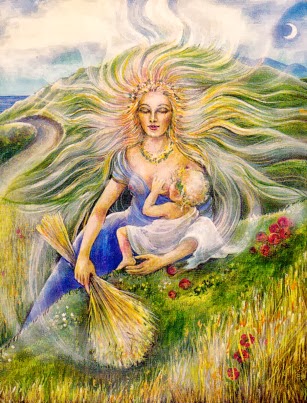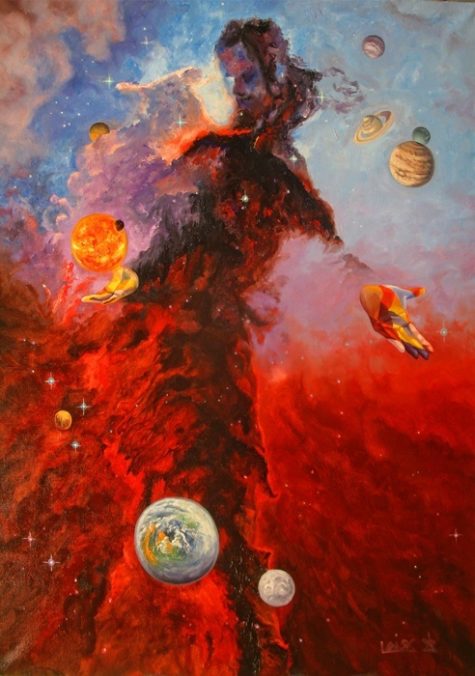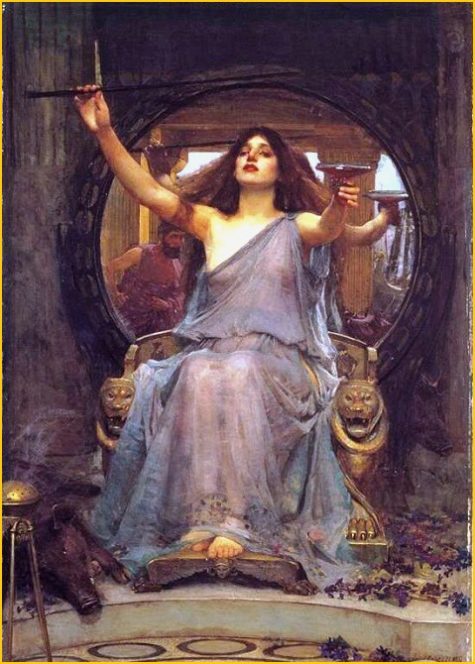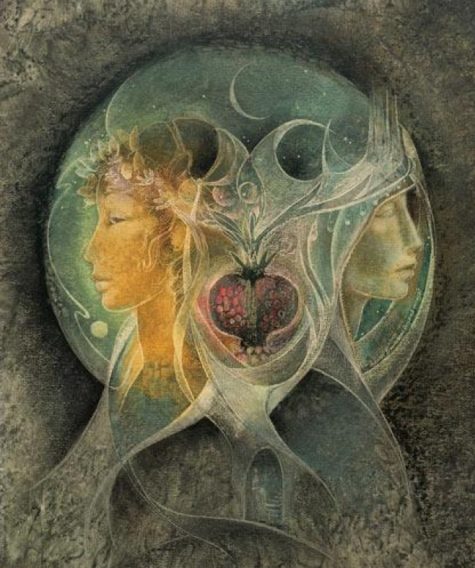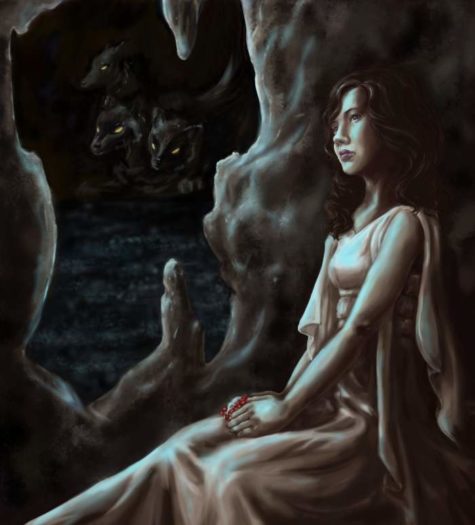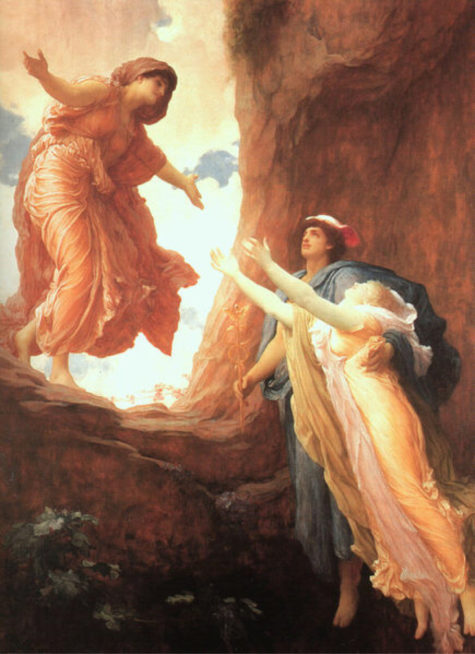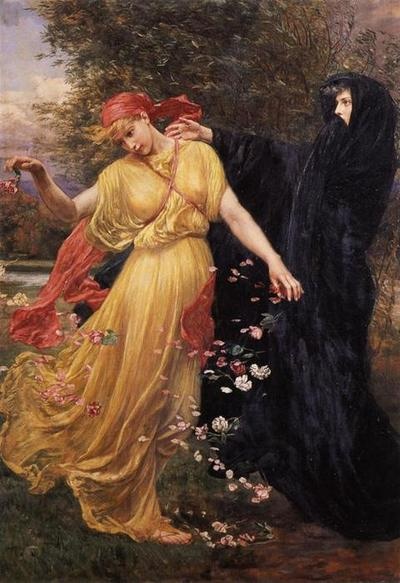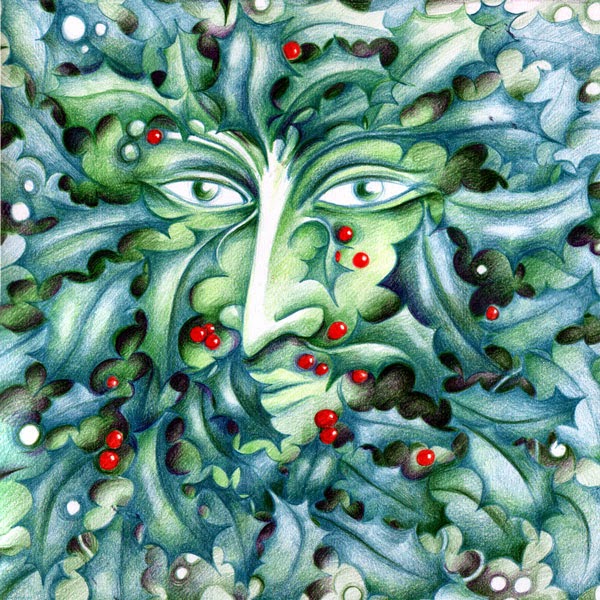Monthly Archives: August 2017
Ishtar Visits The Underworld
Here is the story of Ishtar’s visit to the underworld that is written in a way that is much easier to read, and with a few minor alterations would be suitable for children too.
Ishtar was the Lady of the Gods, the Goddess of fertility. She had been unlucky in love. Her husband Tammuz, the great love of her youth, had died when he was still very young. She had fallen in love with Gilgamesh, that great king, but he had spurned her advances.
In Babylon, the dead were sent to the Underworld, a place of darkness ruled over by the Goddess Irkalla. It was said that in this place they lived on dust and mud. After being rejected by Gilgamesh, Ishtar became depressed and decided she would descend into the Underworld to be with Tammuz. So dressed in her finest garments, brilliant jewelry and her high crown, Ishtar entered the cave that leads into the Underworld. Irkalla’s realm was surrounded by seven walls, each with its own gate that had to be passed to get to the dark Place where the dead resided.
When she got to the first gate, Ishtar called out to the watchman: “Yo watchman, please open this gate and let me enter!” The watchman’s faced peered at her from over the gate. He didn’t say anything, but he didn’t open the gate either.
So she called out again: “Watchman, if you don’t open this gate for me I will force it open, I will break it down, and I will set free all the dead that reside in this dreadful dark place. I will set them free from their gloom and the rule of your merciless mistress and take them to the land of the living! The dead will be so plentiful on earth that they will take over from the living!”
Nedu, as the watchman was called, looked at this fine lady, her crowned head held high, in her splendid attire, and said: ”Please lady, don’t break down the gate. I will go and take your message to the Lady Irkalla. Please wait until I get back.”
When Irkalla heard that Ishtar demanded to be admitted to her realm, she was terribly angry. She thought she would teach this intruder a lesson, and instructed her watchman to admit the proud lady. Nedu returned to the first gate, and opened all the bolts and locks. “Enter into the realm of Irkalla, fine lady”, he said. “Welcome to the place from where nobody ever returns.” As he spoke, he took Ishtar’s crown. She wanted to know why he had taken her crown. “Oh lady,” he said, “if you wish to enter you must submit to the law of Lady Irkalla!” She bent her head and went through the first gate.
Ishtar walked the short distance to the second gate. The watchman opened all the bolts and locks, and said: “Enter into the realm of Irkalla, fine lady. Welcome to the place from where nobody ever returns.” As he spoke, he took the eight pointed star which adorned her neck. She wanted to know why he had taken her jewel. “Oh lady,” he said, “this is the law of Lady Irkalla!” She bent her head, her radiance gone, and went through the second gate.
Ishtar walked the short distance to the third gate. The watchman opened all the bolts and locks, and said: “Enter into the realm of Irkalla, fine lady. Welcome to the place from where nobody ever returns.” As he spoke, he took the gold and bejeweled bracelets from her wrists. She wanted to know why he had taken her bracelets. “Oh lady,” he said, “this is the law of Lady Irkalla!” She bent her head, her radiance gone, and without her magnificent gold ornaments, and went through the third gate.
Ishtar walked the short distance to the fourth gate. The watchman opened all the bolts and locks, and said: “Enter into the realm of Irkalla, fine lady. Welcome to the place from where nobody ever returns.” As he spoke, he took the shoes off her feet. She wanted to know why he had taken her shoes. “Oh lady,” he said, “this is the law of Lady Irkalla!” She bent her head, her radiance gone, and without her magnificent gold ornaments, barefooted she went through the fourth gate.
Ishtar walked the short distance to the fifth gate. The watchman opened all the bolts and locks, and said: “Enter into the realm of Irkalla, fine lady. Welcome to the place from where nobody ever returns.” As he spoke, he took the splendid veil that covered her face. She wanted to know why he had taken her veil. “Oh lady,” he said, “this is the law of Lady Irkalla!” She bent her head, her radiance gone, and without her magnificent gold ornaments, barefaced and barefooted she went through the fifth gate.
Ishtar walked the short distance to the sixth gate. The watchman opened all the bolts and locks, and said: “Enter into the realm of Irkalla, fine lady. Welcome to the place from where nobody ever returns.” As he spoke, he took her magnificent outer robe. She wanted to know why he had taken her outer robe. “Oh lady,” he said, “this is the law of Lady Irkalla!” She bent her head, her radiance gone, and without her magnificent gold ornaments, without the protection of her outer robe, barefaced and barefooted she went through the sixth gate.
Ishtar walked the short distance to the seventh gate. The watchman opened all the bolts and locks, and said: “Enter into the realm of Irkalla, fine lady. Welcome to the place from where nobody ever returns.” As he spoke, he took her dress. She wanted to know why he had taken her dress, leaving her quite naked. “Oh lady,” he said, “this is the law of Lady Irkalla!” And naked now, she bent her head, her radiance gone, and without her magnificent gold ornaments, without the protection of her outer robe, barefaced and barefooted she went through the seventh gate, where she found Irkalla.
Irkalla, the Queen of the Underworld had the head of a lioness and the body of a woman; in her arms she carried her pet, a deadly serpent. She summoned Belisari, the lady of the desert who was her scribe, and who came carrying the clay tablets on which all of Irkalla’s decrees would be written down. Behind these two the dead gathered. There was no light in their eyes; they were dressed not in cloth but feathers, and instead of arms and hands they had the wings of birds. They lived in darkness.
Ishtar became frightfully anxious seeing them, and she wished she had never ventured in this dark place. She had expected to find Tammuz here, but now she realized that this was a hopeless quest. Desperate, she begged Irkalla to allow her to return to the land of the living. Irkalla uttered a cold and contemptuous laugh and when she spoke it was as if an icy wind blew against Ishtar’s naked body.
Irkalla said: “Ishtar, you may be the Lady of the Gods, but you are in my realm now, and nobody returns from this place of darkness. This is called the House of Darkness for good reason, and whoever enters here, magistrate or warrior, king or shepherd, milkmaid or goddess, can never return.
Whoever enters this house has no more need of light. Dust will be your bread and mud will be your meat. Your dress will be a cloak of feathers. The gates are already bolted behind you, lady!”
Having said this, Irkalla summoned Namtar, the demon of the plague. Namtar appeared from the darkness, a viper’s head on a human body, naked underneath a cloak made of bones, and eagles claws instead of feet. He embraced Ishtar, making sure that the plague spread over her whole body. Feathers grew on her, and the light disappeared from her eyes. She tasted dust and ate mud. All memory of her past existence, of her great love Tammuz, disappeared with the light.
On earth a great change came when Ishtar descended into the Underworld. Love and desire became strangers to man and animal alike. Birds no longer sang. Bulls no longer searched out the cows. Stallions were no longer attracted to mares. Rams no longer cared for ewes. Wives no longer caressed their husbands when they returned from business or war. Husbands no longer longed to lie with their wives.
The women in Ishtar’s temple became lonely, nobody wanted to spend time drinking and singing and making merry with them. Shamash, the sun god, was deeply perturbed when he saw the changes that had befallen earth. He could foresee the disaster that awaited earth. Without procreation, without regeneration, there would be no life left on earth once the people and animals who were there now died off. The beings that the gods had created would all be extinct. He knew this was because of Ishtar’s descent into the Underworld, but he also knew that his power was not great enough to overcome Irkalla.
So Shamash went to see Ea, the great god, and told him that earth’s creatures were not renewing themselves. “How is this possible?” asked Ea. Shamash then related that Ishtar had descended to the Underworld, in search of Tammuz, and had not returned.
Ea then created a being he called Udushunamir, which he made devoid of all emotion or fear. With the power of all the gods, Ea sent him as an emissary to the Underworld court of Irkalla, where he would demand the water of life from the dark queen. Because Udushunamir had been created by Ea, the great god, Irkalla had no power over this creature, and could not stop it entering her realm. So Udushunamir entered the Underworld, and stood before Irkalla, where he demanded in the name of the great gods that Irkalla provide him with the water of life, and that Ishtar be brought from the darkness.
Of course Irkalla was furious at this demand. Her body trembled with rage as she roared and cursed both Ishtar and the emissary and all the gods everywhere, but to no avail. Udushunamir, being devoid of all emotion or fear, was unaffected either by the terrible sights in this dark place or by Irkalla’s curses. Irkalla could do nothing but submit, and she ordered the water of life be given to this creature, and so it was. She then summoned Namtar and ordered him to bring the Lady of the Gods from the Darkness.
Ishtar, covered in feathers and her feathers covered in dust, was brought before Udushunamir, who then liberally sprinkled the water of life all over her. The dust fell off Ishtar. The mud fell off Ishtar and the feathers and bird’s wings fell off her. She was alive again.
So she stood before her enemy, Irkalla, her head still bowed, colorless, weaker than a newborn human, just as naked and shaking like a leaf in the storm, but dead no longer. Udushunamir guided her through the darkness to the seventh gate, where Nadu the watchman handed her the dress he had taken from her earlier. She covered her nakedness with it.
She passed through the seventh gate and Udushunamir guided her to the sixth gate. The watchman opened it and gave her back her outer garment, which she put on over her dress.
She passed through the sixth gate and Udushunamir guided her to the fifth gate. The watchman opened it and he handed her back her splendid veil. She took the veil and covered her bare face, then passed though the fifth gate.
Udushunamir guided her to the fourth gate, where the watchman handed her back her shoes. She put them on her bare feet, and proceeded through the fourth gate. Udushunamir guided her to the third gate. The watchman opened it and handed her back her bejeweled bracelets. She took the bracelets and put them on her bare wrists.
She passed through the third gate and Udushunamir guided her to the second gate. The watchman opened it and gave her back the magnificent eight pointed star. Ishtar accepted the jewel and put it back on her neck. She walked through the second gate and Udushunamir guided her to the first gate. The watchman opened it and gave her back her high crown. She took it in her hands, and put it back on her head. Now Ishtar, her garments and ornaments reinstated, could leave the realm of Irkalla.
When she emerged from the cave, the earth was silent. There was no birdsong. No sounds came from the herds of cows and goats. No sailors’ songs came from the harbor. No music came from her temple. But as she walked from the cave her power returned, her neck straightened and her head bowed no longer, her splendor shone brilliantly and she walked as a goddess once more, a smile on her face.
The stallion bayed and the bull bellowed. The rams reared high. Soldiers and merchants alike made excuses to rush home to their wives’ fond embraces. The women in Ishtar’s temple picked up their instruments and sang beguiling words to the men passing by below. All of creation rejoiced in the return of Ishtar. And all the gods rejoiced too, knowing that their creations would renew themselves and would survive to honor and serve them.
Note:
There is more than one lesson to be learned from this myth.
Ishtar’s choice to journey from the Heavens to the Underworld is symbolic of her choice to turn her mind from conscious to the unconscious or from the “above” to the “below”.
Ishtar made this journey to the deepest part of her soul during a phase in her life that we would equate to a “midlife crisis”. This is the shamanic sacrifice of her very own persona so she could gain deep wisdom.
Afterwards the conscious and the unconscious are united and the goddess has a brand new identity. We humans must not fear giving up our symbols of worldly power when doing so provides us with spiritual initiation and rebirth of the soul.
Her death in the Underworld is also a metaphor for the death and rebirth experience.
Source: Soda Head
Ishtar – The Original Myth
At their first encounter, Ishtar is said to have fallen in love with the shepherd boy Tammuz who in turn asks for her hand in marriage. The Holy Marriage of Ishtar and Tammuz takes place and Tammuz is elevated to the god of fertility. As a result, their marriage endows the earth with fertility, and the cyclical renewal of life is ensured.
But a terrible day was to come when Ishtar would lose her lover, and would have to travel to the ends of the earth, and endure much pain and suffering, in order to bring him back.
The myth tells how Tammuz is killed, during the same month that bears his name. In the burning days of late summer the people came to the fields, where Tammuz stood, and cruelly murdered him with sickles scattering his flesh over the land. When the Goddess Ishtar learned of the death of her beloved, she was distraught with grief. Weary and worn from weeping she knew that she must find the spirit of Tammuz and bring him back to life, whatever perils faced her.
Ishtar finally descends to the netherworld to rescue Tammuz from “land of no return.” During these events in the netherworld , everything on earth is withering away. Trees and plants wither and die and animals and humans alike are sterile.
When Ishtar pleads with the Gods to restore Tammuz to life, the Gods agree, but to a partial reprieve only; whereby Tammuz spends six months in the world of the living and the following six months in the netherworld . Hence Tammuz is restored to life in the netherworld and together with his lover Ishtar they triumphantly return to earth on the first day of spring and the start of the New Year in Beth Nahrain.
Over the centuries as the myth was passed from generation to generation the love story was further elaborated. The expanded version of the myth explains how Ishtar’s husband Tammuz, who was also her son and her brother, came together with Ishtar in the world. She bore him, she made love with him and yet she remained a virgin.
After Tammuz was killed by a wild boar, Ishtar put ashes on her head and mourned for 40 days, giving up all pleasures and food. But then, she discovers that she is pregnant. She declares that it is a miraculous conception and in celebration of this miraculous pregnancy, this divine fertility, she has an egg of gold made, calling it the golden egg of Ishtar.
Ishtar searches for Tammuz all over the world. And finally finds him in the netherworld and eventually brings him back to life. Tammuz is resurrected and the vegetation again flourishes.
Source: Assyrian Voice
The Story of King Frost
There was once upon a time a peasant-woman who had a daughter and a step-daughter. The daughter had her own way in everything, and whatever she did was right in her mother’s eyes; but the poor step-daughter had a hard time. Let her do what she would, she was always blamed, and got small thanks for all the trouble she took; nothing was right, everything wrong; and yet, if the truth were known, the girl was worth her weight in gold–she was so unselfish and good-hearted.
But her step-mother did not like her, and the poor girl’s days were spent in weeping; for it was impossible to live peacefully with the woman. The wicked shrew was determined to get rid of the girl by fair means or foul, and kept saying to her father: ‘Send her away, old man; send her away–anywhere so that my eyes sha’n’t be plagued any longer by the sight of her, or my ears tormented by the sound of her voice. Send her out into the fields, and let the cutting frost do for her.’
In vain did the poor old father weep and implore her pity; she was firm, and he dared not gainsay her. So he placed his daughter in a sledge, not even daring to give her a horse-cloth to keep herself warm with, and drove her out on to the bare, open fields, where he kissed her and left her, driving home as fast as he could, that he might not witness her miserable death.
Deserted by her father, the poor girl sat down under a fir-tree at the edge of the forest and began to weep silently. Suddenly she heard a faint sound: it was King Frost springing from tree to tree, and cracking his fingers as he went. At length he reached the fir-tree beneath which she was sitting, and with a crisp crackling sound he alighted beside her, and looked at her lovely face.
‘Well, maiden,’ he snapped out, ‘do you know who I am? I am King Frost, king of the red-noses.’
‘All hail to you, great King!’ answered the girl, in a gentle, trembling voice. ‘Have you come to take me?’
‘Are you warm, maiden?’ he replied.
‘Quite warm, King Frost,’ she answered, though she shivered as she spoke.
Then King Frost stooped down, and bent over the girl, and the crackling sound grew louder, and the air seemed to be full of knives and darts; and again he asked:
‘Maiden, are you warm? Are you warm, you beautiful girl?’
And though her breath was almost frozen on her lips, she whispered gently, ‘Quite warm, King Frost.’
Then King Frost gnashed his teeth, and cracked his fingers, and his eyes sparkled, and the crackling, crisp sound was louder than ever, and for the last time he asked her:
‘Maiden, are you still warm? Are you still warm, little love?’
And the poor girl was so stiff and numb that she could just gasp, ‘Still warm, O King!’
Now her gentle, courteous words and her uncomplaining ways touched King Frost, and he had pity on her, and he wrapped her up in furs, and covered her with blankets, and he fetched a great box, in which were beautiful jewels and a rich robe embroidered in gold and silver. And she put it on, and looked more lovely than ever, and King Frost stepped with her into his sledge, with six white horses.
In the meantime the wicked step-mother was waiting at home for news of the girl’s death, and preparing pancakes for the funeral feast. And she said to her husband: ‘Old man, you had better go out into the fields and find your daughter’s body and bury her.’ Just as the old man was leaving the house the little dog under the table began to bark, saying:
‘YOUR daughter shall live to be your delight; HER daughter shall die this very night.’
‘Hold your tongue, you foolish beast!’ scolded the woman. ‘There’s a pancake for you, but you must say: “HER daughter shall have much silver and gold; HIS daughter is frozen quite stiff and cold.” ‘
But the doggie ate up the pancake and barked, saying: ‘His daughter shall wear a crown on her head; Her daughter shall die unwooed, unwed.’
Then the old woman tried to coax the doggie with more pancakes and to terrify it with blows, but he barked on, always repeating the same words. And suddenly the door creaked and flew open, and a great heavy chest was pushed in, and behind it came the step-daughter, radiant and beautiful, in a dress all glittering with silver and gold.
For a moment the step-mother’s eyes were dazzled. Then she called to her husband: ‘Old man, yoke the horses at once into the sledge, and take my daughter to the same field and leave her on the same spot exactly; ‘and so the old man took the girl and left her beneath the same tree where he had parted from his daughter. In a few minutes King Frost came past, and, looking at the girl, he said:
‘Are you warm, maiden?’
‘What a blind old fool you must be to ask such a question!’ she answered angrily. ‘Can’t you see that my hands and feet are nearly frozen?’
Then King Frost sprang to and fro in front of her, questioning her, and getting only rude, rough words in reply, till at last he got very angry, and cracked his fingers, and gnashed his teeth, and froze her to death.
But in the hut her mother was waiting for her return, and as she grew impatient she said to her husband: ‘Get out the horses, old man, to go and fetch her home; but see that you are careful not to upset the sledge and lose the chest.’
But the doggie beneath the table began to bark, saying: ‘Your daughter is frozen quite stiff and cold, And shall never have a chest full of gold.’
‘Don’t tell such wicked lies!’ scolded the woman. ‘There’s a cake for you; now say: “HER daughter shall marry a mighty King.”
At that moment the door flew open, and she rushed out to meet her daughter, and as she took her frozen body in her arms she too was chilled to death.
Story by Andrew Lang from The Yellow Fairy Book
Homeric Hymn of Demeter and Persephone
I begin to sing of rich-haired Demeter Semne Thea (Reverend goddess) – of her and her trim-ankled daughter (Persephone) whom Aidoneus rapt away, given to him by all-seeing Zeus the loud-thunderer.
Apart from Demeter Khrysaoros (Lady of the golden sword) Aglaokarpos (Giver of glorious fruits), she was playing with the deep-bosomed daughters of Okeanos and gathering flowers over a soft meadow, roses and crocuses and beautiful violets, irises also and hyacinths and the narcissus, which Ge (Earth) made to grow at the will of Zeus and to please the Host of Many (Haides), to be a snare for the bloom-like girl.
The girl was amazed and reached out with both hands to take the lovely toy; but the wide-pathed earth yawned there in the Nysion plain, and the lord, Host of Many, with his immortal horses sprang out upon her.
He caught her up reluctant on his golden car and bare her away lamenting. Then she cried out shrilly with her voice, calling upon her father, the Son of Kronos (Zeus), who is most high and excellent. But no one, either of the deathless gods or of mortal men, heard her voice, nor yet the olive-trees bearing rich fruit: only tender-hearted Hekate, bright-coiffed, the daughter of Persaios, heard the girl from her cave, and the lord Helios (the Sun), Hyperion’s bright son, as she cried to her father, the Son of Kronos (Zeus).
But he was sitting aloof, apart from the gods, in his temple where many pray, and receiving sweet offerings from mortal men. So he, that Son of Kronos (Haides), of many names … was bearing her away by leave of Zeus on his immortal chariot – his own brother’s child and all unwilling.
And so long as she, the goddess, yet beheld earth and starry heaven and the strong-flowing sea where fishes shoal, and the rays of the sun, and still hoped to see her dear mother (Demeter) and the tribes of the eternal gods, so long hope calmed her great heart for all her trouble; and the heights of the mountains and the depths of the sea rang with her immortal voice: and her queenly mother heard her.
Bitter pain seized her (Demeter’s) heart, and she rent the covering upon her divine hair with her dear hands: her dark cloak she cast down from both her shoulders and sped, like a wild-bird, over the firm land and yielding sea, seeking her child. But no one would tell her the truth, neither god nor mortal men; and of the birds of omen none came with true news for her.
Then for nine days queenly Deo wandered over the earth with flaming torches in her hands, so grieved that she never tasted ambrosia and the sweet draught of nectar, nor sprinkled her body with water.
But when the tenth enlightening dawn had come, Hekate, with a torch in her hands, met her, and spoke to her and told her news: “Queenly Demeter Horephoros (Bringer of seasons) Aglaodoros (Giver of good gifts), what god of heaven or what mortal man has rapt away Persephone and pierced with sorrow your dear heart? For I heard her voice, yet saw not with my eyes who it was. But I tell you truly and shortly all I know.” So, then, said Hekate. And the daughter of rich-haired Rhea (Demeter) answered her not, but sped swiftly with her, holding flaming torches in her hands.
So they came to Helios (the Sun), who is watchman of both gods and men, and stood in front of his horses: and the bright goddess enquired of him: “Helios, do you at least regard me, goddess as I am, if ever by word or deed of mine I have cheered your heart and spirit. Through the fruitless air I heard the thrilling cry of my daughter whom I bare, sweet scion of my body and lovely in form, as of one seized violently; though with my eyes I saw nothing. But you — for with your beams you look down from the bright upper air Over all the earth and sea – tell me truly of my dear child, if you have seen her anywhere, what god or mortal man has violently seized her against her will and mine, and so made off.”
So said she. And the Son of Hyperion answered her: “Queen Demeter, daughter of rich-haired Rhea, I will tell you the truth; for I greatly reverence and pity you in your grief for your trim-ankled daughter. None other of the deathless gods is to blame, but only cloud-gathering Zeus who gave her to Aides, her father’s brother, to be called his buxom wife. And Aides seized her and took her loudly crying in his chariot down to his realm of mist and gloom. Yet, goddess, cease your loud lament and keep not vain anger unrelentingly: Aidoneus, the Ruler of Many, is no unfitting husband among the deathless gods for your child, being your own brother and born of the same stock: also, for honour, he has that third share which he received when division was made at the first, and is appointed lord of those among whom he dwells.”
So he spake, and called to his horses: and at his chiding they quickly whirled the swift chariot along, like long-winged birds.
But grief yet more terrible and savage came into the heart of Demeter, and thereafter she was so angered with dark-clouded Kronios (Zeus) that she avoided the gathering of the gods and high Olympos, and went to the towns and rich fields of men, disfiguring her form a long while. And no one of men or deep-bosomed women knew her when they saw her, until she came to the house of wise Keleos who then was lord of fragrant Eleusis.
Vexed in her dear heart, she sat near the wayside by the Phrear Parthenios (Maiden Well), from which the women of the place were used to draw water, in a shady place over which grew an olive shrub. And she was like an ancient woman who is cut off from childbearing and the gifts of garland-loving Aphrodite, like the nurses of king’s children who deal justice, or like the house-keepers in their echoing halls.
There the daughters of Keleos, son of Eleusis, saw her, as they were coming for easy-drawn water, to carry it in pitchers of bronze to their dear father’s house: four were they and like goddesses in the flower of their girlhood, Kallidike and Kleisidike and lovely Demo and Kallithoe who was the eldest of them all. They knew her not, – for the gods are not easily discerned by mortals – but standing near by her spoke winged words: “Old mother, whence and who are you of folk born long ago? Why are you gone away from the city and do not draw near the houses? For there in the shady halls are women of just such age as you, and others younger; and they would welcome you both by word and by deed.'”
Thus they said. And she, that queen among goddesses answered them saying: “Hail, dear children, whosoever you are of woman-kind. I will tell you my story; for it is not unseemly that I should tell you truly what you ask. Doso is my name, for my stately mother gave it me. And now I am come from Krete over the sea’s wide back, – not willingly; but pirates brought be thence by force of strength against my liking.
“Afterwards they put in with their swift craft to Thorikos, and there the women landed on the shore in full throng and the men likewise, and they began to make ready a meal by the stern-cables of the ship. But my heart craved not pleasant food, and I fled secretly across the dark country and escaped by masters, that they should not take me unpurchased across the sea, there to win a price for me.
“And so I wandered and am come here: and I know not at all what land this is or what people are in it. But may all those who dwell on Olympos give you husbands and birth of children as parents desire, so you take pity on me, maidens, and show me this clearly that I may learn, dear children, to the house of what man and woman I may go, to work for them cheerfully at such tasks as belong to a woman of my age.
“Well could I nurse a new born child, holding him in my arms, or keep house, or spread my masters’ bed in a recess of the well-built chamber, or teach the women their work.”
So said the goddess. And straightway the unwed maiden Kallidike, goodliest in form of the daughters of Keleos, answered her and said: “Mother, what the gods send us, we mortals bear perforce, although we suffer; for they are much stronger than we.
“But now I will teach you clearly, telling you the names of men who have great power and honour here and are chief among the people, guarding our city’s coif of towers by their wisdom and true judgements: there is wise Triptolemos and Dioklos and Polyxeinos and blameless Eumolpos and Dolikhos and our own brave father. All these have wives who manage in the house, and no one of them, so soon as she has seen you, would dishonour you and turn you from the house, but they will welcome you; for indeed you are godlike.
But if you will, stay here; and we will go to our father’s house and tell Metaneira, our deep-bosomed mother, all this matter fully, that she may bid you rather come to our home than search after the houses of others. She has an only son, late-born, who is being nursed in our well-built house, a child of many prayers and welcome: if you could bring him up until he reached the full measure of youth, any one of womankind who should see you would straightway envy you, such gifts would our mother give for his upbringing.”
So she spake: and the goddess bowed her head in assent. And they filled their shining vessels with water and carried them off rejoicing. Quickly they came to their father’s great house and straightway told their mother according as they had heard and seen. Then she bade them go with all speed and invite the stranger to come for a measureless hire.
As hinds or heifers in spring time, when sated with pasture, bound about a meadow, so they, holding up the folds of their lovely garments, darted down the hollow path, and their hair like a crocus flower streamed about their shoulders. And they found the good goddess near the wayside where they had left her before, and led her to the house of their dear father. And she walked behind, distressed in her dear heart, with her head veiled and wearing a dark cloak which waved about the slender feet of the goddess.
Soon they came to the house of heaven-nurtured Keleos and went through the portico to where their queenly mother sat by a pillar of the close-fitted roof, holding her son, a tender scion, in her bosom. And the girls ran to her. But the goddess walked to the threshold: and her head reached the roof and she filled the doorway with a heavenly radiance.
Then awe and reverence and pale fear took hold of Metaneira, and she rose up from her couch before Demeter, and bade her be seated. But Demeter Horephoros (bringer of seasons) and Aglaodoros (giver of perfect gifts), would not sit upon the bright couch, but stayed silent with lovely eyes cast down until careful Iambe placed a jointed seat for her and threw over it a silvery fleece.
Then she sat down and held her veil in her hands before her face. A long time she sat upon the stool without speaking because of her sorrow, and greeted no one by word or by sign, but rested, never smiling, and tasting neither food nor drink, because she pined with longing for her deep-bosomed daughter, until careful Iambe – who pleased her moods in aftertime also – moved the holy lady with many a quip and jest to smile and laugh and cheer her heart.
Then Metaneira filled a cup with sweet wine and offered it to her; but she refused it, for she said it was not lawful for her to drink red wine, but bade them mix meal and water with soft mint and give her to drink. And Metaneira mixed the draught and gave it to the goddess as she bade. So the great queen Deo received it to observe the sacrament.
And of them all, well-girded Metaneira first began to speak: “Hail, lady! For I think you are not meanly but nobly born; truly dignity and grace are conspicuous upon your eyes as in the eyes of kings that deal justice. Yet we mortals bear perforce what the gods send us, though we be grieved; for a yoke is set upon our necks. But now, since you are come here, you shall have what I can bestow: and nurse me this child whom the gods gave me in my old age and beyond my hope, a son much prayed for. If you should bring him up until he reach the full measure of youth, any one of womankind that sees you will straightway envy you, so great reward would I give for his upbringing.”
Then Eustephanos (beautiful-crowned) Demeter answered her: “And to you, also, lady, all hail, and may the gods give you good! Gladly will I take the boy to my breast, as you bid me, and will nurse him. Never, I ween, through any heedlessness of his nurse shall witchcraft (epelysia) hurt him nor yet the Undercutter (teething in infants): for I know a charm far stronger than the Woodcutter, and I know an excellent safeguard against woeful witchcraft.”
When she had so spoken, she took the child in her fragrant bosom with her divine hands: and his mother was glad in her heart. So the goddess nursed in the palace Demophoon, wise Keleos’ goodly son whom well-girded Metaneira bare. And the child grew like some immortal being, not fed with food nor nourished at the breast: for by day Kallistephanos (rich-crowned) Demeter would anoint him with ambrosia as if he were the offspring of a god and breathe sweetly upon him as she held him in her bosom. But at night she would hide him like a brand in the heard of the fire, unknown to his dear parents.
And it wrought great wonder in these that he grew beyond his age; for he was like the gods face to face. And she would have made him deathless and unageing, had not well-girded Metaneira in her heedlessness kept watch by night from her sweet-smelling chamber and spied. But she wailed and smote her two hips, because she feared for her son and was greatly distraught in her heart; so she lamented and uttered winged words: “Demophoon, my son, the strange woman buries you deep in fire and works grief and bitter sorrow for me.”
Thus she spoke, mourning. And the bright goddess, Kallistephanos (lovely-crowned) Demeter, heard her, and was wroth with her. So with her divine hands she snatched from the fire the dear son whom Metaneira had born unhoped-for in the palace, and cast him from her to the ground; for she was terribly angry in her heart.
Forthwith she said to well-girded Metaneira: “Witless are you mortals and dull to foresee your lot, whether of good or evil, that comes upon you. For now in your heedlessness you have wrought folly past healing; for – be witness the oath of the gods, the relentless water of Styx – I would have made your dear son deathless and unaging all his days and would have bestowed on him everlasting honour, but now he can in no way escape death and the fates. Yet shall unfailing honour always rest upon him, because he lay upon my knees and slept in my arms.
But, as the years move round and when he is in his prime, the sons of the Eleusinians shall ever wage war and dread strife with one another continually. Lo! I am that Demeter who has share of honour and is the greatest help and cause of joy to the undying gods and mortal men. But now, let all the people build be a great temple and an altar below it and beneath the city and its sheer wall upon a rising hillock above Kallikhoros. And I myself will teach my rites, that hereafter you may reverently perform them and so win the favour of my heart.”
When she had so said, the goddess changed her stature and her looks, thrusting old age away from her: beauty spread round about her and a lovely fragrance was wafted from her sweet-smelling robes, and from the divine body of the goddess a light shone afar, while golden tresses spread down over her shoulders, so that the strong house was filled with brightness as with lightning.
And so she went out from the palace. And straightway Metaneira’s knees were loosed and she remained speechless for a long while and did not remember to take up her late-born son from the ground. But his sisters heard his pitiful wailing and sprang down from their well-spread beds: one of them took up the child in her arms and laid him in her bosom, while another revived the fire, and a third rushed with soft feet to bring their mother from her fragrant chamber. And they gathered about the struggling child and washed him, embracing him lovingly; but he was not comforted, because nurses and handmaids much less skilful were holding him now.
All night long they sought to appease the glorious goddess, quaking with fear. But, as soon as dawn began to show, they told powerful Keleos all things without fail, as Kallistephanos (the lovely-crowned) goddess Demeter charged them. So Keleos called the countless people to an assembly and bade them make a goodly temple for Eukomos (rich-haired) Demeter and an altar upon the rising hillock. And they obeyed him right speedily and harkened to his voice, doing as he commanded.
As for the child, he grew like an immortal being. Now when they had finished building and had drawn back from their toil, they went every man to his house.
But Xanthe (golden-haired) Demeter sat there (in her new-built temple in Eleusis) apart from all the blessed gods and stayed, wasting with yearning for her deep-bosomed daughter. Then she caused a most dreadful and cruel year for mankind over the all-nourishing earth: the ground would not make the seed sprout, for Eustephanos (rich-crowned) Demeter kept it hid.
In the fields the oxen drew many a curved plough in vain, and much white barley was cast upon the land without avail. So she would have destroyed the whole race of man with cruel famine and have robbed them who dwell on Olympos of their glorious right of gifts and sacrifices, had not Zeus perceived and marked this in his heart.
First he sent golden-winged Iris to call Eukomos (rich-haired) Demeter, lovely in form. So he commanded. And she obeyed the dark-clouded Son of Kronos, and sped with swift feet across the space between. She came to the stronghold of fragrant Eleusis, and there finding Kuanopeplos (dark-cloaked) Demeter in her temple, spake to her and uttered winged words: “Demeter, father Zeus, whose wisdom is everlasting, calls you to come join the tribes of the eternal gods: come therefore, and let not the message I bring from Zeus pass unobeyed.”
Thus said Iris imploring her. But Demeter’s heart was not moved. Then again the father sent forth all the blessed and eternal gods besides: and they came, one after the other, and kept calling her and offering many very beautiful gifts and whatever right she might be pleased to choose among the deathless gods. Yet no one was able to persuade her mind and will, so wrath was she in her heart; but she stubbornly rejected all their words: for she vowed that she would never set foot on fragrant Olympos nor let fruit spring out of the ground, until she beheld with her eyes her own fair-faced daughter.
Now when all-seeing Zeus the loud-thunderer heard this, he sent Argeiphontes (Hermes) whose wand is of gold to Erebos, so that having won over Hades with soft words, he might lead forth chaste Persephone to the light from the misty gloom to join the gods, and that her mother might see her with her eyes and cease from her anger.
And Hermes obeyed, and leaving the house of Olympus, straightway sprang down with speed to the hidden places of the earth. And he found the lord Aides in his house seated upon a couch, and his shy mate with him, much reluctant, because she yearned for her mother. But she was afar off, brooding on her fell design because of the deeds of the blessed gods.
And strong Argeiphontes drew near and said: “Dark-haired Aides, ruler over the departed, father Zeus bids me bring noble Persephone forth from Erebos unto the gods, that her mother may see her with her eyes and cease from her dread anger with the immortals; for now she plans an awful deed, to destroy the weakly tribes of earthborn men by keeping seed hidden beneath the earth, and so she makes an end of the honours of the undying gods. For she keeps fearful anger and does not consort with the gods, but sits aloof in her fragrant temple, dwelling in the rocky hold of Eleusis.”
So he said. And Aidoneus, ruler over the dead, smiled grimly and obeyed the behest of Zeus the king. For he straightway urged wise Persephone, saying: “Go now, Persephone, to your dark-robed mother, go, and feel kindly in your heart towards me: be not so exceedingly cast down; for I shall be no unfitting husband for you among the deathless gods, that am own brother to father Zeus. And while you are here, you shall rule all that lives and moves and shall have the greatest rights among the deathless gods: those who defraud you and do not appease your power with offerings, reverently performing rites and paying fit gifts, shall be punished for evermore.”
When he said this, wise Persephone was filled with joy and hastily sprang up for gladness. But he on his part secretly gave her sweet pomegranate seed to eat, taking care for himself that she might not remain continually with grave, dark-robed Demeter.
Then Aidoneus the Ruler of Many openly got ready his deathless horses beneath the golden chariot. And she mounted on the chariot, and strong Argeiphontes (Hermes) took reins and whip in his dear hands and drove forth from the hall, the horses speeding readily. Swiftly they traversed their long course, and neither the sea nor river-waters nor grassy glens nor mountain-peaks checked the career of the immortal horses, but they clave the deep air above them as they went. And Hermes brought them to the place where rich-crowned Demeter was staying and checked them before her fragrant temple.
And when Demeter saw them, she rushed forth as does a Maenad down some thick-wooded mountain, while Persephone on the other side, when she saw her mother’s sweet eyes, left the chariot and horses, and leaped down to run to her, and falling upon her neck, embraced her.
But while Demeter was still holding her dear child in her arms, her heart suddenly misgave her for some snare, so that she feared greatly and ceased fondling her daughter and asked of her at once: “My child, tell me, surely you have not tasted any food while you were below? Speak out and hide nothing, but let us both know. For if you have not, you shall come back from loathly Aides and live with me and your father, the dark-clouded Son of Kronos (Zeus) and be honoured by all the deathless gods; but if you have tasted food, you must go back again beneath the secret places of the earth, there to dwell a third part of the seasons every year: yet for the two parts you shall be with me and the other deathless gods. But when the earth shall bloom with the fragrant flowers of spring in every kind, then from the realm of darkness and gloom thou shalt come up once more to be a wonder for gods and mortal men. And now tell me how he rapt you away to the realm of darkness and gloom, and by what trick did the strong Host of Many beguile you?”
Then beautiful Persephone answered her thus: “Mother, I will tell you all without error. When luck-bringing Hermes came, swift messenger from my father the Son of Kronos (Zeus) and the other Sons of Heaven, bidding me come back from Erebos that you might see me with your eyes and so cease from your anger and fearful wrath against the gods, I sprang up at once for joy; but he secretly put in my mouth sweet food, a pomegranate seed, and forced me to taste against my will. Also I will tell how he rapt me away by the deep plan of my father the Son of Kronos and carried me off beneath the depths of the earth [she retells the story of her rape] … All this is true, sore though it grieves me to tell the tale.”
So did they turn, with hearts at one, greatly cheer each the other’s soul and spirit with many an embrace: their heart had relief from their griefs while each took and gave back joyousness.
Then bright-coiffed Hekate came near to them, and often did she embrace the daughter of Hagne (holy) Demeter: and from that time the lady Hekate was minister and companion to Persephone.
And all-seeing Zeus sent a messenger to them, rich-haired Rhea, to bring dark-cloaked Demeter to join the families of the gods: and he promised to give her what right she should choose among the deathless gods and agreed that her daughter should go down for the third part of the circling year to darkness and gloom (winter), but for the two parts (spring and summer] should live with her mother and the other deathless gods. Thus he commanded.
And the goddess did not disobey the message of Zeus; swiftly she rushed down from the peaks of Olympos and came to the plain of Rharos, rich, fertile corn-land once, but then in nowise fruitful, for it lay idle and utterly leafless, because the white grains was hidden by design of Kallisphyros (trim-ankled) Demeter. But afterwards, as springtime waxed, it was soon to be waving with long ears of corn, and its rich furrows to be loaded with grain upon the ground, while others would already be bound in sheaves.
There first she landed from the fruitless upper air: and glad were the goddesses to see each other and cheered in heart. Then bright-coiffed Rhea said to Demeter: “Come, my daughter; for far-seeing Zeus the loud- thunderer calls you to join the families of the gods, and has promised to give you what rights you please among the deathless gods, and has agreed that for a third part of the circling year your daughter shall go down to darkness and gloom, but for the two parts shall be with you and the other deathless gods: so has he declared it shall be and has bowed his head in token. But come, my child, obey, and be not too angry unrelentingly with the dark-clouded Son of Kronos; but rather increase forthwith for men the fruit that gives them life.”
So spake Rhea. And Eustephanos (well-girdled) Demeter did not refuse but straightway made fruit to spring up from the rich lands, so that the whole wide earth was laden with leaves and flowers.
Then she (Demeter) went, and to the kings who deal justice, Triptolemos and Diokles, the horse-driver, and to doughty Eumolpos and Keleos, leader of the people, she showed the conduct of her rites and taught them all her mysteries, to Triptolemos and Polyxeinos and Diokles also, – awful mysteries which no one may in any way transgress or pry into or utter, for deep awe of the gods checks the voice.
Happy is he among men upon earth who has seen these mysteries; but he who is uninitiate and who has no part in them, never has lot of like good things once he is dead, down in the darkness and gloom. But when the bright goddess had taught them all, they went to Olympos to the gathering of the other gods. And there they dwell beside Zeus who delights in thunder, awful and reverend goddesses. Right blessed is he among men on earth whom they freely love: soon they do send Ploutos (Agricultural Wealth) as guest to his great house, Ploutos who gives wealth to mortal men.
James Cheney: Invocation To The Dark Mother
Daniel: Prayer Before The Final Battle
blessed obyno: Queen of Ghosts
blessed obyno: Queen of Ghosts
Caerlion Arthur: The Great, Bloody and Bruised Veil of the World
